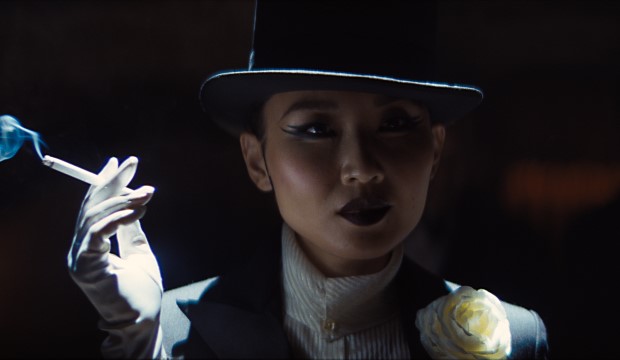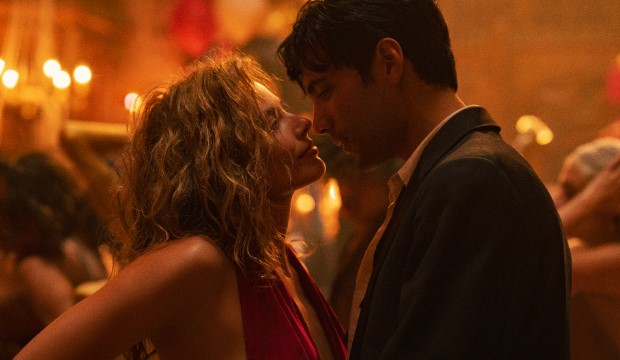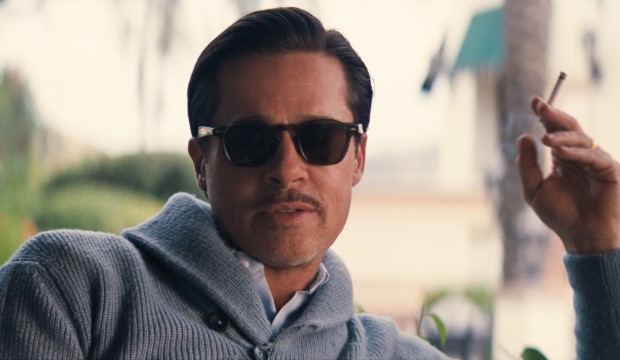Babylon review ★★★★★
Writer/director Damien Chazelle returns with an orgiastic appreciation of hedonistic Hollywood during the Roaring Twenties, starring Margot Robbie, Brad Pitt, and Diego Calva
Margot Robbie in Babylon (Photo: Paramount/EPK)
Babylon has been nominated for three Oscars: Best Original Score, Best Costume Design, Best Production Design.
Oh no, not more Oscar bait about Tinseltown. What’s the point? Esteemed filmmakers are making them like existential clockwork. Even worse are the battalions of veteran film critics encouraging them, going misty-eyed over the infinite LA sunshine in Paul Thomas Anderson’s Licorice Pizza and Quentin Tarantino’s Once Upon A Time in Hollywood. The same dread seemed destined for the Whiplash and La La Land filmmaker Damien Chazelle and his plot-lite epic Babylon, primed for Oscar season.
It’s therefore flustering to admit the film is a masterpiece: one deserving of all the stars and trophies in the world. More than a repressed, antiquated love letter, Babylon is a brilliantly unabashed orgy of lust for Hollywood and the history of cinema as a whole.

Li Jun Li as Lady Fay Zhu. Photo: Paramount
You're thrust into a Jazz Age concert of eclectic characters, meeting in a Bel-Air party of inebriated hedonism that would make Baz Luhrmann blush. This Californian mansion spills with booze, breasts and sex from all directions. Outrageous, exciting and revolting by the standards of today, never mind 1926. Even when the party lulls with the voice of seductive singer Lady Fay Zhu (Li Jun Li) – dressed in masculine top hat and tails like Marlene Dietrich in Morocco (1930) – she’s performing a number called My Girl’s Pussy.
Firstly, however, you start with Mexican-American waiter Manny (a fierce breakthrough by Diego Calva), who’s desperate to work in movies. All day and night, he fixes problems.
The only guest to really notice and remember Manny is the aspiring movie star Nellie LaRoy, largely modelled on Clara Bow and delivered perfectly by a frenetic, magnetic and voluptuous Margot Robbie in her most unforgettable role to date. Oozing with sex, pleasure and liberation, Nellie heads straight to a buffet table piled with drugs before dancing to the horny, heady swing of the jazz orchestra, led by the Duke Ellington-inspired Sidney Palmer (Jovan Adepo).
And who’s that coming in? It’s the silent movie star Jack Conrad, plied with alcohol and played by Brad Pitt with endless panache and charm and humour. With Justin Hurwitz’s deliriously delicious jazz score, a part of you wishes the party would never end.

Margot Robbie and Diego Calva as Nellie and Manny. Photo: Paramount
The sun rises and the circus of 20s filmmaking begins, turning into another breathless avalanche of multisensory chaos. Several scenes shot all at once on a vast plain of empty desert. Chunks of scattered sets. Armies of fake soldiers and disgruntled workers. Full orchestras playing in the absence of sound. Scripts change, cameras break, extras die. All of it for one shot, which, once perfected, provides a wonderful climax of congratulations.
But that starburst of fun and absurdity concludes with The Jazz Singer (1927) and the advent of sound in movies. Counter-intuitively, the auditory innovations render the behind-the-scenes creativity into dispiriting silence. Vast sound stages are erected to make movies with as much precision and as little chaos as possible, which only creates more chaos as familiar methods dissolve. When a newly discovered Nellie performs in this environment, it's uproariously frustrating, and shackles the freedom in which she once thrived.
The influence of the rigid Hays Code – designed to censor morally questionable movies in the studio system – ripples across the industry. But Manny, working his way up, constantly evolves to new standards. The former world crumbles, leaving many behind. Lives and careers melt like the Wicked Witch in slow motion. You feel that loss, that pain of a moment lost to time.

Brad Pitt as Jack Conrad. Photo: Paramount
The film soon descends into a Lynchian nightmare, with a creepy late appearance from Tobey Maguire stepping into a Danté-esque hellscape of underground tunnels. As polite social structures consume the delicate world outside, nastier licentiousness breeds in the darkness below.
Chazelle balances the entertaining excesses and aesthetic achievements of the industry with the bleaker aspects. He’s nostalgic and sentimental, but doesn’t dress up the horrors, the regret, and the tragedy that a place like Hollywood can create. It’s a glorious and contentious period, unfurling with such gripping acceleration that more than justifies its three-hour runtime. Constantly funny, constantly thrilling and constantly shocking, Babylon is a romantic, stupendous, and cinephilic triumph!
Babylon will be in UK cinemas on Friday 20 January.
Oh no, not more Oscar bait about Tinseltown. What’s the point? Esteemed filmmakers are making them like existential clockwork. Even worse are the battalions of veteran film critics encouraging them, going misty-eyed over the infinite LA sunshine in Paul Thomas Anderson’s Licorice Pizza and Quentin Tarantino’s Once Upon A Time in Hollywood. The same dread seemed destined for the Whiplash and La La Land filmmaker Damien Chazelle and his plot-lite epic Babylon, primed for Oscar season.
It’s therefore flustering to admit the film is a masterpiece: one deserving of all the stars and trophies in the world. More than a repressed, antiquated love letter, Babylon is a brilliantly unabashed orgy of lust for Hollywood and the history of cinema as a whole.

Li Jun Li as Lady Fay Zhu. Photo: Paramount
You're thrust into a Jazz Age concert of eclectic characters, meeting in a Bel-Air party of inebriated hedonism that would make Baz Luhrmann blush. This Californian mansion spills with booze, breasts and sex from all directions. Outrageous, exciting and revolting by the standards of today, never mind 1926. Even when the party lulls with the voice of seductive singer Lady Fay Zhu (Li Jun Li) – dressed in masculine top hat and tails like Marlene Dietrich in Morocco (1930) – she’s performing a number called My Girl’s Pussy.
Firstly, however, you start with Mexican-American waiter Manny (a fierce breakthrough by Diego Calva), who’s desperate to work in movies. All day and night, he fixes problems.
The only guest to really notice and remember Manny is the aspiring movie star Nellie LaRoy, largely modelled on Clara Bow and delivered perfectly by a frenetic, magnetic and voluptuous Margot Robbie in her most unforgettable role to date. Oozing with sex, pleasure and liberation, Nellie heads straight to a buffet table piled with drugs before dancing to the horny, heady swing of the jazz orchestra, led by the Duke Ellington-inspired Sidney Palmer (Jovan Adepo).
And who’s that coming in? It’s the silent movie star Jack Conrad, plied with alcohol and played by Brad Pitt with endless panache and charm and humour. With Justin Hurwitz’s deliriously delicious jazz score, a part of you wishes the party would never end.

Margot Robbie and Diego Calva as Nellie and Manny. Photo: Paramount
The sun rises and the circus of 20s filmmaking begins, turning into another breathless avalanche of multisensory chaos. Several scenes shot all at once on a vast plain of empty desert. Chunks of scattered sets. Armies of fake soldiers and disgruntled workers. Full orchestras playing in the absence of sound. Scripts change, cameras break, extras die. All of it for one shot, which, once perfected, provides a wonderful climax of congratulations.
But that starburst of fun and absurdity concludes with The Jazz Singer (1927) and the advent of sound in movies. Counter-intuitively, the auditory innovations render the behind-the-scenes creativity into dispiriting silence. Vast sound stages are erected to make movies with as much precision and as little chaos as possible, which only creates more chaos as familiar methods dissolve. When a newly discovered Nellie performs in this environment, it's uproariously frustrating, and shackles the freedom in which she once thrived.
The influence of the rigid Hays Code – designed to censor morally questionable movies in the studio system – ripples across the industry. But Manny, working his way up, constantly evolves to new standards. The former world crumbles, leaving many behind. Lives and careers melt like the Wicked Witch in slow motion. You feel that loss, that pain of a moment lost to time.

Brad Pitt as Jack Conrad. Photo: Paramount
The film soon descends into a Lynchian nightmare, with a creepy late appearance from Tobey Maguire stepping into a Danté-esque hellscape of underground tunnels. As polite social structures consume the delicate world outside, nastier licentiousness breeds in the darkness below.
Chazelle balances the entertaining excesses and aesthetic achievements of the industry with the bleaker aspects. He’s nostalgic and sentimental, but doesn’t dress up the horrors, the regret, and the tragedy that a place like Hollywood can create. It’s a glorious and contentious period, unfurling with such gripping acceleration that more than justifies its three-hour runtime. Constantly funny, constantly thrilling and constantly shocking, Babylon is a romantic, stupendous, and cinephilic triumph!
Babylon will be in UK cinemas on Friday 20 January.
TRY CULTURE WHISPER
Receive free tickets & insider tips to unlock the best of London — direct to your inbox
| What | Babylon review |
| When |
20 Jan 23 – 20 Jan 24, IN CINEMAS |
| Price | £n/a |
| Website | Click here for more information |